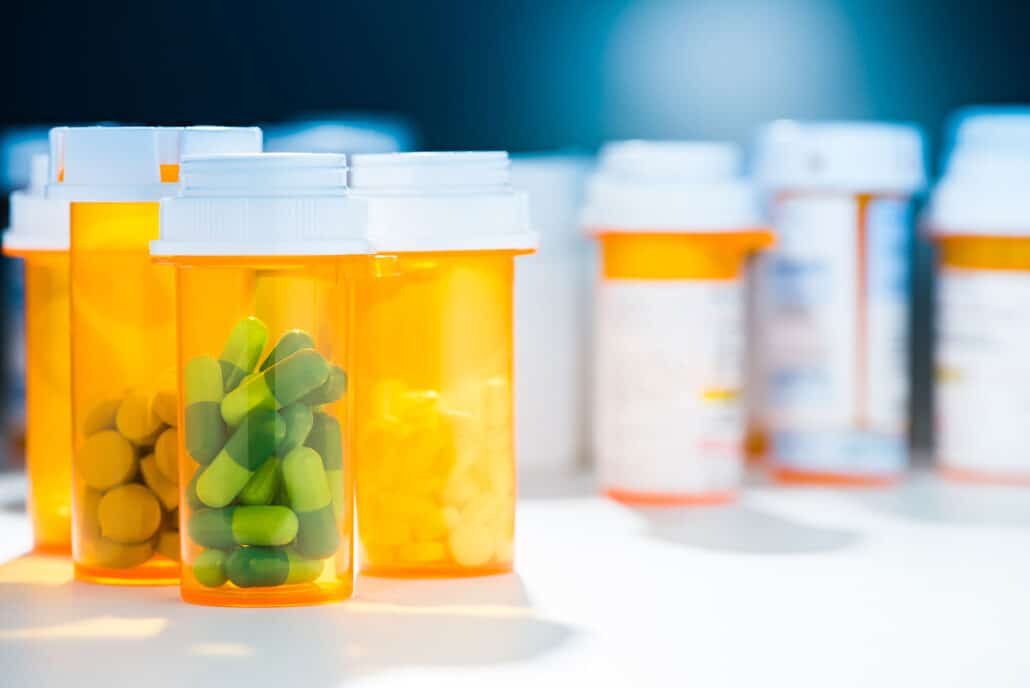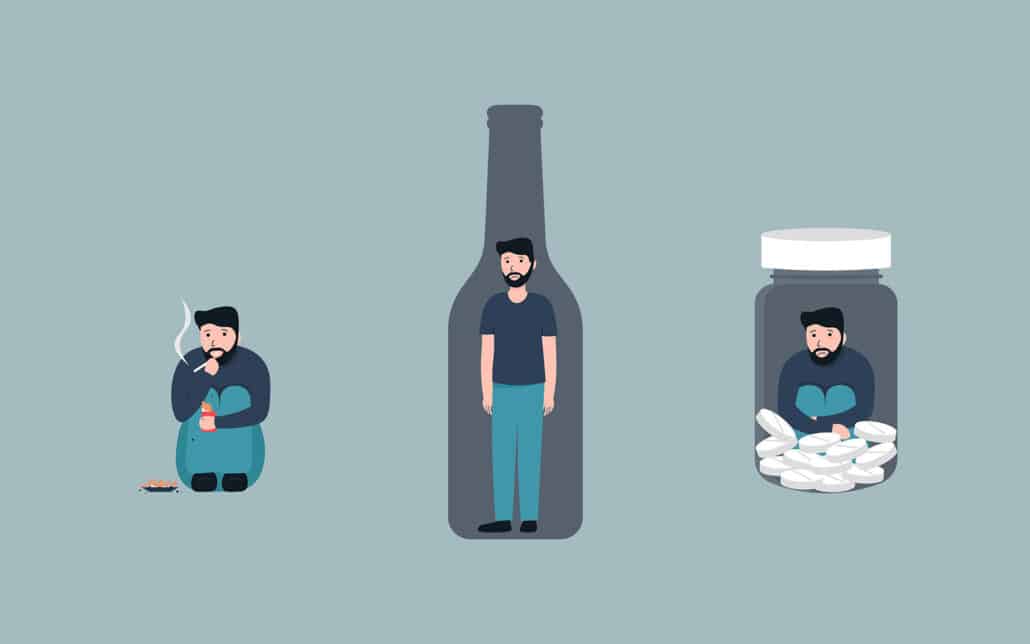People take Lexapro to relieve symptoms of depression, anxiety, and other mental disorders. This medication can be very helpful on its own. However, when mixed with alcohol, Lexapro can quickly become dangerous. You don’t want anyone in your life to inadvertently hurt themselves. Therefore, if you believe that a loved one is at risk of consuming alcohol while taking Lexapro, then you should take a look at this overview of how the two substances interact.

Table of Contents
What is Lexapro?
Lexapro is the brand name of escitalopram, a selective serotonin reuptake inhibitor (SSRI) that doctors commonly prescribe as an antidepressant. An SSRI essentially works by allowing certain parts of the brain to absorb more serotonin, which is an important natural hormone that positively affects a person’s mood. On its own, Lexapro isn’t very harmful. Doctors consider the drug non-habit-forming, and the side effects are fairly mild.
Dangers of Lexapro Misuse
Unlike benzodiazepines, pain medications, and other prescription drugs, SSRIs do not give the user any sort of high when taken in large quantities. Thus, most people do not intentionally ingest more than the prescribed dose. However, if someone takes too much Lexapro at once for some reason, then they may experience nausea, constipation, confusion, heart palpitations, or serotonin syndrome. Long-term misuse can result in kidney damage, liver damage, and exacerbated symptoms of depression.
Effects of Mixing Lexapro and Alcohol
Taking Lexapro with alcohol may worsen some of the more debilitating effects of alcohol intoxication. Many people who take Lexapro with alcohol report drowsiness, poor coordination, erratic mood, and other problematic symptoms. On top of that, alcohol can worsen symptoms of depression and counteract the effects of an antidepressant. Therefore, someone who takes an SSRI but regularly drinks may not see their symptoms of depression improve. While most people who take Lexapro can have an occasional beer or glass of wine, patients should always discuss the matter with their doctor before consuming any alcohol.
Signs of Alcohol Addiction
Lexapro isn’t addictive, and excessive consumption of the drug won’t make a person high. Patients don’t really have any incentive to intentionally misuse Lexapro. Because of this, mixing Lexapro and alcohol is a bigger indication of an alcohol problem than anything else. People tend to take antidepressants with alcohol simply because drinking is a part of their daily routine. Therefore, it’s more important to look for signs of alcohol dependence if you suspect that someone in your life is taking their prescribed antidepressant with alcohol. Slurred speech, confusion, erratic mood, poor coordination, and other effects of intoxication are the most conspicuous signs of an alcohol problem.

However, many of the other symptoms of alcohol addiction may not be so obvious. When someone regularly consumes alcohol, their body becomes dependent on it. Consequently, they will begin to experience early withdrawal symptoms after several hours without a drink. Common withdrawal symptoms include fatigue, irritability, shaking, headache, sweating, and muscle weakness.
Dangers of Alcohol Detoxification
Many people try to quit alcohol without outside help. However, overcoming alcohol addiction presents some unique challenges compared to other addictive substances. In contrast to other drugs, alcohol detoxification can be deadly. If a person manages to make it past the early signs of withdrawal, then they may begin to experience hallucinations, extreme confusion, and even deadly seizures. The worst symptoms usually occur between 48 and 72 hours after the last drink. After that, symptoms slowly become more manageable as the body adjusts to sobriety.
Treatments for Pill Abuse and Alcoholism
Although Lexapro presents very little risk of misuse, some patients who take Lexapro also take other prescription medications that could be addictive. Combined with alcohol dependence, misuse of prescription drugs is a recipe for disaster. Overcoming alcohol addiction is already very difficult and dangerous without professional treatment.
This is exacerbated by the fact that people rely on Lexapro and similar medications to function properly, so they cannot simply stop taking them. Thus, it’s extremely important for patients who take prescription medications while struggling with alcohol addiction to receive professional help at a reputable treatment facility. The addiction specialists at a high-quality facility have the necessary skills, tools, and infrastructure to help your loved one achieve sobriety. Below are some of the most common treatment programs for individuals suffering from addiction.
Detox
Without proper medical supervision, patients have a significant risk of encountering severe complications during alcohol detox. At a high-quality detox facility, medical staff and addiction specialists will constantly monitor patients and make the detoxification process as safe and comfortable as possible. Medical professionals will be right there if the patient experiences seizures or requires medical aid. After a week or two, the patient will have overcome the most dangerous stages of detoxification, and they’ll be able to enroll in less intensive addiction treatment programs.
Inpatient Treatment
An inpatient program allows patients to stay at a facility for several weeks or months while they receive the highest standard of care. Patients will regularly undergo individual therapies, group therapies, and holistic therapies during their stay. Inpatient programs remove patients from the stresses of daily life and separate them from potential triggers or bad influences. In turn, the patient will be more likely to succeed as they make it through this major step in the treatment process.
Intensive Outpatient Program
Some patients shift to an intensive outpatient program after receiving inpatient treatment. Other patients immediately go to an intensive outpatient program after they’ve undergone detoxification. An intensive outpatient program provides a similar level of care as an inpatient program. Patients will spend over 10 hours per week receiving various therapies at the addiction treatment facility.
However, patients don’t stay at a treatment facility in an outpatient program. Because of this, an intensive outpatient program is a great way for patients to receive a high level of care without missing work and other important obligations. Any type of outpatient program will only be successful if the patient lives in an environment that facilitates sobriety. Therefore, patients who live with or around triggers or bad influences should consider enrolling in an inpatient program while they find better accommodations.
Regular Outpatient Programs
In a standard outpatient program, addiction specialists will assess the patient’s needs, and the patient will accordingly receive a tailored combination of group therapies, individual therapies, and other therapies. Generally, patients will receive treatment between one and three times per week in a regular outpatient program. During this phase of the treatment continuum, patients will work closely with addiction professionals to come up with plans and contingencies to maintain long-term sobriety as they settle into regular life.

Why a Treatment Center Is the Best Choice
Some people have been fortunate enough to achieve sobriety on their own. However, professional treatment is a much better option for those who have access to it. A reputable treatment center will keep patients safe and greatly increase their odds of success while removing them from harmful triggers during their recovery. The following list details some of the most important benefits of professional addiction treatment.
Patients Can Build the Necessary Skills To Thrive
Addiction specialists understand the ins and outs of substance dependence. They’ve spent years dedicating their lives to learning about how to treat addiction, and they continue to update their skills and methods with the most recent scientific advancements in mind. Thus, when a patient works with certified addiction specialists, they can leverage this knowledge and develop the most effective coping mechanisms to face the challenges involved in maintaining long-term sobriety.
Regular Care
Withdrawal symptoms can be extremely difficult to endure without professional help. Because of this, many individuals who struggle with addiction are unable to get through the worst stages of the detox process. A treatment center gives patients access to addiction specialists and medical personnel and prevents them from accessing alcohol when symptoms become unpleasant. Thus, patients will be more likely to make it through detoxification and move forward in their journey to overcome their addiction.
Peer Support
Many individuals who struggle with addiction feel extremely isolated. Society demonizes people with substance abuse problems, which can seriously damage their self-worth and sabotage their efforts to achieve sobriety. At an addiction treatment center, patients meet people who struggle with similar challenges. Thus, they won’t feel so alone in their quest to become sober, and they’ll receive valuable support from their peers as they attempt to achieve a healthier lifestyle.
Receive Effective Treatment at Long Island Interventions
Mixing Lexapro and other medications with alcohol can have serious repercussions. By enrolling in the right treatment program, your loved ones will overcome their alcohol addiction so that they can take their medications without the risk of negative drug interactions. You want your loved one to enjoy a happier, healthier life, so contact Long Island Interventions today to find the right solution for their unique situation.
Published on: 2022-05-30
Updated on: 2025-03-13

